Polls, Expectations, and Elections
Polls, Expectations, and Elections
TV News Making in U.S. Presidential Campaigns
Richard Craig
LEXINGTON BOOKS
Lanham Boulder New York London
Published by Lexington Books
An imprint of The Rowman & Littlefield Publishing Group, Inc.
4501 Forbes Boulevard, Suite 200, Lanham, Maryland 20706
www.rowman.com
Unit A, Whitacre Mews, 2634 Stannary Street, London SE11 4AB
Copyright 2015 by Lexington Books
All rights reserved . No part of this book may be reproduced in any form or by any electronic or mechanical means, including information storage and retrieval systems, without written permission from the publisher, except by a reviewer who may quote passages in a review.
British Library Cataloguing in Publication Information Available
Library of Congress Cataloging-in-Publication Data
Craig, Richard.
Polls, expectations, and elections : TV news making in U.S. presidential campaigns / Richard Craig.
pages cm
Includes bibliographical references and index.
ISBN 978-0-7391-9149-1 (cloth : alk. paper)ISBN 978-0-7391-9150-7 (electronic)
1. Television broadcasting of newsPolitical aspectsUnited States. 2. Television and politicsUnited States. 3. PresidentsUnited StatesElection. 4. Mass media and public opinionUnited States. 5. JournalismPolitical aspectsUnited States. 6. Public opinion pollsUnited States. I. Title.
PN4888.T4C73 2014
070.44932470973dc23 2014034030
 The paper used in this publication meets the minimum requirements of American National Standard for Information SciencesPermanence of Paper for Printed Library Materials, ANSI/NISO Z39.48-1992.
The paper used in this publication meets the minimum requirements of American National Standard for Information SciencesPermanence of Paper for Printed Library Materials, ANSI/NISO Z39.48-1992.
Printed in the United States of America
Contents
Acknowledgments
Befitting a study covering multiple decades of material, this project has evolved over many years. It began with my doctoral dissertation, continued on and off through years of working at universities, and endured other projects elbowing it out of the way off and on. Now that its finally complete, Id like to thank some of the people who helped make it possible.
First, I need to thank the folks in academia that helped immensely in nudging it toward completion. At the Institute of Communications Research at the University of Illinois, numerous people were hugely helpful in helping me gain my academic footing after a career in journalism. My lead dissertation adviser, Chuck Whitney, was the first to recognize the potential of the idea, and worked with me for many hours in developing and crafting the proper approach. John Nerone and Mike McBurnett also contributed greatly throughout the process, helping refine concepts and reading endless drafts. (Id also like to thank John for the pizza and beer after my dissertation defense.) Others who were helpful at that stage of the process include Cliff Christians, Ellen Wartella, Howard Maclay, Bill Berry, Jim Carey, Tom Littlewood, Lou Liebovich and all my fellow grad students (you know who you are).
My first visit to the CBS Broadcast Center to read transcripts for this project was in October 1994; my last was nearly twenty years later. In every instance, the folks handling the archives at the CBS Reference Library were gracious and generous in helping me track down the material I needed to make this project happen. Cryder Bankes, Bob Tomlin, Laura Kapnick, and Carole Parnes all deserve abundant thanks for allowing this weirdo grad student/researcher/professor from California to walk the hallowed halls that Cronkite and Murrow once roamed. Thanks also to Ann Fotiades at CBS News Information Resources for helping me to secure permissions to use the excerpts that make the book lively and informative.
I would like to thank the faculty, staff and students in the School of Journalism and Mass Communications at San Jos State University, my academic home since 2000, for their support and input throughout this process. Im especially grateful to Ken Blas, Dennis Wilcox, Bill Briggs and Bob Rucker, directors of the school during this period, for their support in helping to secure the resources needed to complete the project (and for keeping me employed all this time).
Id also like to thank my co-advisers on the Spartan Daily student news outlet, Mack Lundstrom, Jan Shaw and Kim Komenich, for their suggestions and support (and Tim Hendrick for paying the bills). Their influence has made me a far better journalist and teacher. My other faculty colleagues at SJSU have also been hugely helpful, and I deeply appreciate all theyve done for me over the years. In addition, Michelle Anaya helped put together research materials when I was swamped, and Dona Nichols, Cynthia Fernald and John Shrader were great sounding boards for all things related to journalism, politics, sports and pretty much anything else.
I also owe great thanks to the folks at Lexington Books, who saw potential in the project and made the process of developing the book as close to a breeze as possible. Alison Pavan and Emily Frazzette were total professionals every step of the way and treated my manuscript as something significant and worthy of attention, not just the next thing on the assembly line. Its truly been a pleasure working with them.
Most important, my wife Melissa (who I hadnt even met at the start of this project) has not only shown the patience of Job throughout the process, but has also read drafts, brainstormed with me, allowed me to vent and even tolerated the mountains of books in my office. Without her love and support, theres no way I could have completed this book.
Introduction
The Democratic Process, Television, and Polls
ABC News anchor Peter Jennings was a member of the panel of questioners in the first presidential debate between Michael Dukakis and George Bush in 1988, held at Wake Forest University in Winston-Salem, North Carolina. The event was witnessed by millions on television but seen in person by very few. After the debate was over, he rushed from the stage to the ABC booth in the auditorium to participate in a debate analysis program, a common part of TV network coverage of such events. When asked by colleague David Brinkley what he thought of the debate, Jennings replied I dont know, I havent seen it on television.
This occurrence might seem unimportant, yet it says a lot about the environment in which todays presidential campaigns operate. This incident suggests that the televised presentation of a campaign event matters more than the actual content of the event itself. It also implies something more unsettlingthat media coverage is necessary for translating political events. The fact is that today Americans get the overwhelming majority of their political information from the mass media, which sometimes makes it difficult to differentiate the campaign itselfthe candidates and issuesfrom the news medias coverage and analysis of the campaigns day-to-day happenings.
For a variety of reasonschanges in the American electoral system, an increase in televisions reach into American households, an absence of other effective means of informing the publictelevision has become the great interpreter of American presidential campaigns. Social media and the web have become hugely popular in the 2000s, but as of 2012, a majority of Americans still get their news from TV.
While political commercials, social media and partisan websites give their one-sided pictures of the candidates and issues, news organizations have taken it upon themselves to follow the campaign daily, through the primaries and on through the general election, and translate the various complicated goings-on into reports that are easy for the mass public to understand. With the task of filing campaign stories every day, however, there has grown a need for consistent material on which to report. Public opinion polls have filled that void for journalists, offering objective information (not emanating from either party) that garners viewer interest. While polls also serve other functionsalerting candidates and their staffs to how they stand and which areas they can improve upon, and letting people know what their peers thinkthey have come to serve a new role in campaign coverage in recent years. Polls have become more than just a journalistic crutchthey have become a central catalyst for most presidential campaign reporting.
Next page
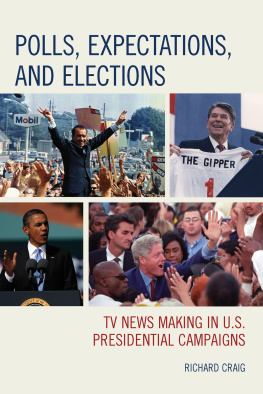

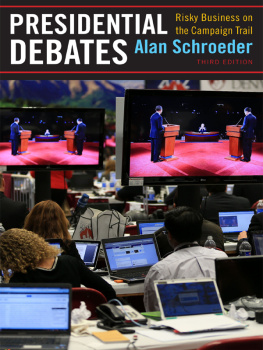
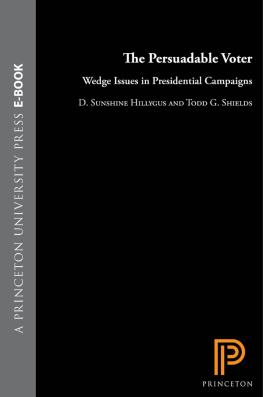
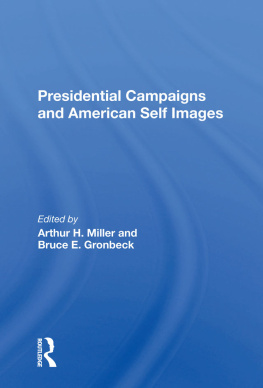
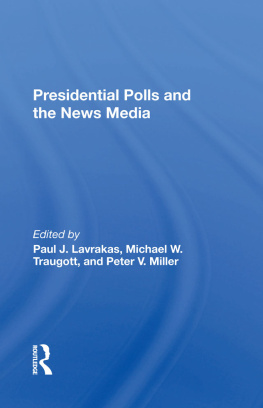
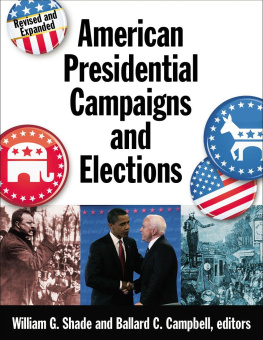
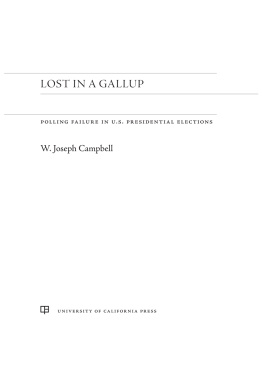
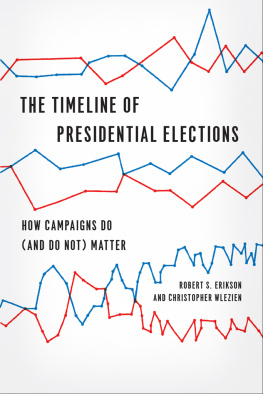
 The paper used in this publication meets the minimum requirements of American National Standard for Information SciencesPermanence of Paper for Printed Library Materials, ANSI/NISO Z39.48-1992.
The paper used in this publication meets the minimum requirements of American National Standard for Information SciencesPermanence of Paper for Printed Library Materials, ANSI/NISO Z39.48-1992.